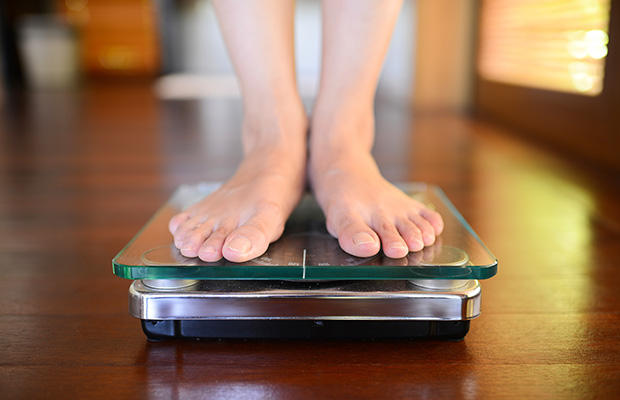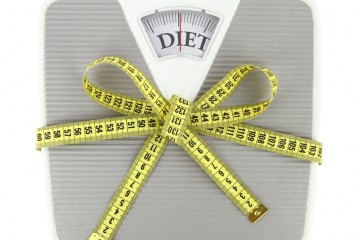Skip the doughnuts and splurge on that body-hugging dress you've been eyeing or sign up for a cardio dance class you never thought you'd be able to handle. Meanwhile, don't forget to bask in the little things: Take a moment to appreciate how comfortable you are when you get down on the floor to play with your puppy or chase your kids around the backyard. (Here are the best exercises for weight loss.)
Sorry, you don't get to go back to your old eating habits.
Those who are most likely to succeed at both losing weight and keeping it off are those who adjust their eating habits in a way that's sustainable, says Cederquist. That's because you need to keep doing most of what you did to shed the weight in order to prevent it from creeping back on. Cederquist says following some structure—three healthy meals plus a couple of planned snacks each day—tends to work best. (Take a look at what a perfect day of eating looks like.) She also encourages clients to ditch the "diet" mindset. "It's not uncommon for patients to tell me this isn't a diet, it's a way of life," she says.
The D-word is problematic because it's usually (uh, always?) associated with suffering, deprivation, and discomfort. And very few people are able to follow a plan that's super-restrictive, dangerously low in calories, or made up solely of liquids for very long. If such extreme measures have helped you reach your goal weight, now's the time to take a new approach—one that you can reasonably manage for the rest of your life without messing up your health or happiness. (Here are 10 tips for long-lasting weight loss.)
That said, you can probably afford a few more "treats."
Cederquist isn't a fan of the phrase "cheat meals," since making something forbidden immediately makes it more appealing. Instead, she encourages her patients who want to lose weight to eat something once a week just for the joy of it, such as dessert or more wine or a hunk of crusty bread. After you switch to weight maintenance, you can allow yourself a few more of these indulgences—but don't go too crazy. Exactly how much more you can eat without gaining varies based on your activity level and metabolism, but it's somewhere in the neighborhood of 500 calories a day. Keep a close eye on the scale to make sure you're not going overboard. (Burn more belly fat with these 4 foods.)
Speaking of the scale, you do have to step on it regularly.
 Photograph by Photo Talk/getty images
Photograph by Photo Talk/getty images
Daily weigh-ins rarely do anyone much good, since tiny fluctuations are perfectly normal and there's no point obsessing over them. But avoiding the scale for too long is a mistake as well: You don't want to be surprised to learn that you've gained back 5 pounds, says Cederquist. Among the more than 10,000 members of the National Weight Control Registry, a database of adults who have lost at least 30 pounds and maintained it for a year or longer, 75% say they weigh themselves at least once a week. (Here's what happens when you stop weighing yourself.)
You'll get a good report card from your doctor.
You already know there's a lengthy list of health conditions that can improve or be prevented by getting to a healthy weight and staying there. But you might not know that these perks can be pretty immediate. Metabolic markers linked to type 2 diabetes and heart disease tend to improve within just 6 weeks of losing weight, says Cederquist. Ask your doc to check your blood sugar and lipid levels (including cholesterol), then get ready to give yourself another pat on the back. (Here are 10 foods that lower cholesterol naturally.)
You may do some soul searching.
 Photograph by Maria Dubova/getty images
Photograph by Maria Dubova/getty images
"Losing 50 pounds won't fix a bad marriage, and it won't make a life-sucking job satisfying," says Cederquist. Once you've reached your goal weight, it might become clear that it was the bad marriage all along making you unhappy, not how you looked in your swimsuit. Now it's time to do the heavy lifting, emotionally speaking. "There's work to do, but very valuable work that can allow people to change their lives," she says.
It may also take some time to adjust to the new "you." Despite being as slender as ever, you might still find yourself feeling self-conscious about your body and any extra attention it might attract. Cut yourself some slack as you learn to adapt. (Here are 11 inspirational quotes to inspire your weight loss journey.)
You'll either become a guru or a mortal enemy to family and friends.
OK, maybe "mortal enemy" is a little strong, but you can anticipate a little jealousy. Cederquist recalls a patient who had lost about 75 pounds and had taken a picture of herself wearing one of her daughter's skirts. Her daughter, clearly rubbed the wrong way, sneakily started bringing mom the specific kinds of food she'd been trying to avoid in an act of sabotage. On the other hand, you'll also probably have coworkers who want to know all your slimming secrets. "Friends and family can be extremely supportive, but sometimes they can feel threatened," Cederquist says.
You might have some loose skin that didn't get the memo to scram!
Depending on your genes and how much weight you've lost, you might find that your skin doesn't quite snap back into place. (Read about this woman's experience with excess skin after weight loss.) Some maintainers opt for surgery to remove excess skin, while others decide to live with it. Either way, consider it a sign of how far you've come.
 Photograph by GS/getty images
Photograph by GS/getty images



